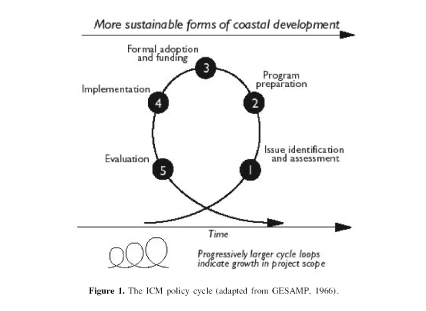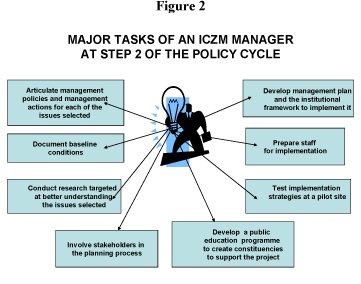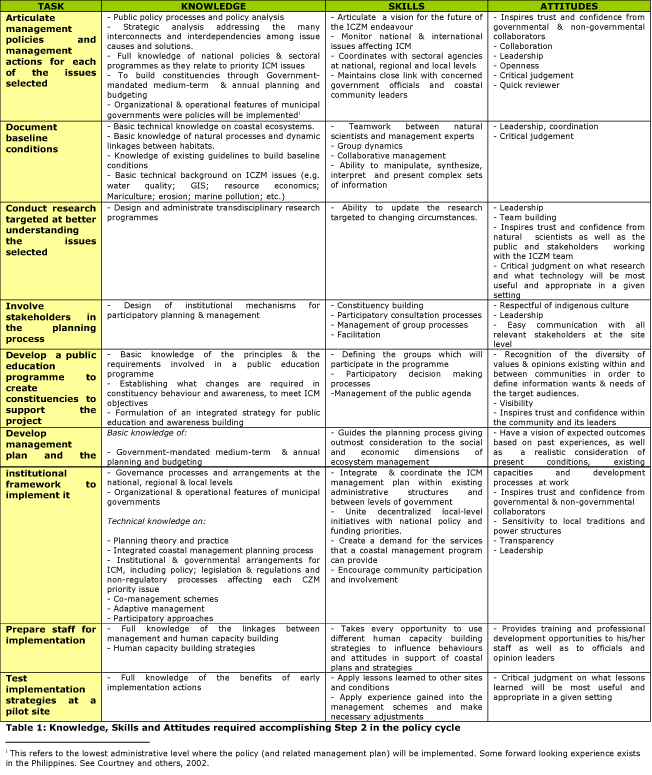Capacity Building Needs Associated to the ICZM Cycle
This article provides information on the ICZM Policy Cycle and Capacity Building.
Contents
Introduction
Creating the capacity of individuals in the field of Integrated Coastal Zone Management (ICZM) (also called Human Capacity Building), has been long considered an element of individual projects and programmes. However, interest has never been in examining which should be the most appropriate learning paths for the training, professional development and education of so called coastal managers. After three decades of CZM experience world wide, coastal managers, funding organizations and the academia are considering major future investments in the extensive training and education of individuals in this field.
A number of factors are contributing to the resurgence of Capacity Building in ICZM as one of the key ingredients for the successful design and implementation of projects and programs that address the complexity of issues at the transition between the land and the sea.
First, ICZM practitioners have identified serious shortcomings in skilled manpower in coastal management, even in countries having very long experience in ICZM.
Second, teaching and learning experiences, together with a few systematic needs assessments conducted at the field level, have provided rich insights as to what is really needed in terms of personnel to be trained with the necessary abilities. Likewise, there is an increasing demand for building the capacities required to achieve the outcomes that ICZM aspires to generate [1].
Third, a number of institutions have been examining the needs for learning and performing of the multiple tasks that are required of a coastal manager. Lengthy discussions (and excellent publications) had been put on the table regarding the technical competence and the management skills required for an effective and efficient performance, particularly for coastal management practitioners [2].
Furthermore, at the moment, experience individuals advocate that ICZM courses should focus not only on the technical and scientific knowledge and skills for coastal management, but more on the professional, project management, and practice skills (and knowledge) critical to today’s coastal management – skills that include policy and decision-making, conflict resolution, and communications.
One way of examining the required knowledge, skills and attitudes (K/S/A) required in a coastal manager is to look into the ICZM policy cycle and the related tasks involved [3]. This will signal the way into a solid understanding of the job requirements, and thus of what and how it should be done to perform effectively. We will first review the policy cycle and its most relevant characteristics. Second, we will trace one of the steps in the policy cycle and examine the associated K/S/As in detail.
The Coastal Management Policy Cycle
As described by Torell (2000)[4], the policy cycle framework has its roots in Lasswell’s (1956)[5] approach to making good governance operational by grouping the process by which public policy evolves into a sequence of functional phases. This approach was further developed by others including Brewer (1974)[6] and de Leon (1999) [7]. GESAMP(1996)[8] offered a version of the public policy cycle as a framework for grouping the activities associated with five phases within a generation of coastal management (see Figure 1)[9]. In the same year, 15 bilateral and multilateral donors further discussed the need for common methodologies for learning from the rapidly accumulating experience in the practice of coastal management worldwide. This was achieved in 1999 through a Manual for Assessing Progress in Coastal Management[10]
Effective governance of coastal systems can emerge and evolve in many different ways. The method offered here[11] for assessing and managing coastal systems begins with:
(1) An analysis of problems and opportunities (Step 1).
(2) The formulation of a course of action (Step 2).
(3) The stage when stakeholders, managers, and political leaders commit to new behaviours and allocate the resources by which the necessary actions will be implemented (Step 3).
(4) This involves formalization of a commitment and allocation of the necessary authority and funds to carry forward (Step 4).
(5) Evaluation of successes, failures, learning and re-examination of how the issues themselves have changed rounds out a generation of the management cycle (Step 5).
The time required to complete a cycle is an important issue. Experience in many countries has shown that the typical ICZM process actually takes from eight to twelve years to complete a planning cycle or generation, at the scale of a province or a nation. At the community scale the cycle has been competed in three to four years. Organizing the many actions undertaken to advance a coastal management initiative emphasizes that successful initiatives link the steps within a generation of management—particularly the need to bridge between steps devoted primarily to planning (Steps 1, 2, and 3) and a period of policy implementation (Step 4)[12]
The policy cycle applies a problem-solving perspective to policy development and calls for multidisciplinary, interactive responses that recognize the roles of social norms and personal values in the management process. The priority actions and the good practices associated with them are rebuttable presumptions that should be tested, rejected, or refined as the practice evolves[13].
The 1999 manual[14] offers a set of priority actions for each of the five steps and then poses questions that are designed to probe how these steps and actions are being adapted to a given situation and whether they are being strategically linked as a program evolves. There are predictable consequences of changing the order in which the steps are taken. For example, formalizing the objectives of a management effort and the institutional structure by which those objectives will be met through a law or decree (Step 3) before making a thorough assessment of the issues in consultation with those who will be most affected (Step 1 and 2) is an option with predictable risks. This does not mean that this is not a good strategy in some situations [15].
For the analysis of the K/S/As, we will take the priority actions embodied in step 2 Programme Preparation in order to examine (as an example) the multiplicity of tasks and roles that a coastal manager should assume.
Coastal managers: professionals with multiple tasks
Coastal managers are professionals difficult to characterize. This is because they are not yet recognized as members of what may be evolving into an expression of a new profession -the ecosystem management-, and there are not as yet codified professional standards.
During the last three decades the discipline and the practice of ICZM has evolved from the experience of specialists in complementary fields such as e.g. marine biology, environmental resource management, urban planning and/or other scientific disciplines. Today, it is difficult to find an individual that possess all technical knowledge and management skills required to attend the multiple tasks involved in ICZM and to manage a team of specialists that support an ICZM effort. There are a few excellent professionals who posses all the necessary K/S/As, but they are the exception.
Olsen (1995) states that the knowledge and skills of an ideal coastal manager can be grouped into three broad categories, namely: a) skills in strategic analysis and the policy process, b) knowledge of how ecosystems function, and c) cultural literacy. [16] Let’s see how these categories are played out at the step 2 of the ICM policy cycle.
Step 2 of the ICM Policy Cycle
If we look into the main tasks of a coastal manager at step 2 of the policy cycle entitled Program Preparation (see figure 2), the portrait of this professional is further broadened. According to Nakashima (1997)[17], while Stage 1 can be conducted based on pre-existing information, Stage 2 is a longer process of information generation and planning that can extend from three to five years. The major task of this stage is to formulate the goals, specific objectives, policies and plans in a participatory manner with all stakeholders.
- Stakeholders from the various levels must be active participants if the participatory process is to be maintained and meaningful.
- Scientific research is used to fill gaps considered as important to the understanding and addressing of priority coastal issues.
- A well designed targeted monitoring scheme must be included so that baseline data can be gathered before implementation of the program commences. Monitoring by stakeholders is recommended as it increases ownership of the planning process.
- Required investments are identified and budgets prepared, priorities are set and the detailed program design occurs.
- The plan should be a vision of the future which expresses the changes in behaviour, how resources are allocated and used, the qualities of the environment that the programme will try to attain, and how the changes are measured.
- Initiate early implementation activities at selected demonstration sites.
The following analysis of the corresponding knowledge, skills and attitudes has been done only for illustrative purposes. The K/S/As required of a coastal manager will be modified by the locale, its culture, its traditions of management and the specific issues at play.
If we further examine the knowledge, skills and attitudes (K/S/As) required to accomplish the eight tasks involved in Step 2 of the policy cycle, we may identify, among others, the following (see Table 1):
Note: The list of knowledge, skills and attitudes contained in Table 1 is meant to be indicative, not exhaustive. It is open to further discussion in the ENCORA Coastal Wiki. In real life, a similar exercise should be done for each of the stages of the policy cycle.
The examination of K/S/As involved in Step 2 of the policy cycle is indicative of the complexity, breath and depth of the challenges that must be addressed by a coastal manager. This is a profession that is rooted in a combination of inter-disciplinary knowledge, technical skills, innate political sense and leadership. Though knowledge and technical skills can be acquired through rigorous study and practice, the understanding of e.g. group processes, involving values, behaviour, attitudes and power, sometimes defies traditional learning that focus on compartmentalized disciplines and professional groups.
In terms of Capacity Building, ICZM calls for innovative learning schemes. These schemes should aim to the integration across traditional disciplines, the provision of technical skills, as well as professional expertise in-situ, through practice and discussion of case studies and field experience.
Capacity Building for ICZM is a formidable challenge. This is due to the fact that in addition to his/her numerous tasks, the coastal manager does not work alone. A coastal management team involves a number of specialists in different fields of knowledge who bring their expertise at different stages of the policy cycle. The coastal manager is who orchestrate and leads the planning and management team.
Related articles
- Assessment of training needs
- Methodologies for assessing the capacity needs in ICZM
- Decision support tools
Further reading
- UNDP Practice Note: Capacity Assessment
- Capacity Development Group Bureau for Development Policy November 2008
- Capacity Assessment and Development –in a systems and strategic management context
References
- ↑ Kay, R. And Alder, J., 1999. Coastal Planning and Management. E & FN Spon, Routlege, p.165.
- ↑ C.Coley and others, 2002. Learning and Performing: Developing Skills for Coastal Management Practitioners. Final report on the First Course on Building Capacity for Sustainable Integrated Coastal Management in the Western Indian Ocean Region. 46pp.
- ↑ Olsen, S., 1995. The skills, Knowledge and Attitudes of an Ideal Coastal Manager. Educating Coastal Managers: Proceedings from the Rhode Island Workshop. Coastal Resources Management Project, Coastal Resources Center, The University of Rhode Island, and the Center for the Environment, US Agency for International Development. Narragansett, RI, USA. 184 p.
- ↑ Torell, E. 2000. Adaptation and learning in coastal management: The experience of five East African initiatives. Coastal Management 28(4).
- ↑ Lasswell, H. D. 1956. The decision process; seven categories of functional analysis. College Park, MD: University of Maryland Press.
- ↑ Brewer, G. D. 1974. The policy sciences emerge: To nurture and structure a discipline. Policy Sciences 5(3).
- ↑ De Leon, P. 1999. The stages approach to the policy process: What has it done? Where is it going? In Theories of the policy process, ed. P. Sabatier. Boulder, CO: Westview Press.
- ↑ GESAMP (IMO/FAO/UNESCO-OOC/WMO/WHO/IAEA/UN/UNEP Joint Group of Experts on the Scientific. Aspects of Marine Environmental Protection). 1996. The Contributions of Science to Integrated Coastal Management. GESAMP Reports and Studies No. 61.
- ↑ Olsen S.B. 2002. Assessing Progress Towards the Goals of Coastal Management. Coastal Management, 30:325-345.
- ↑ Olsen, S., K. Lowry, and J. Tobey. 1999. A manual for assessing progress in coastal management. Coastal Resources Center Report #2211. Narragansett, RI: University of Rhode Island.
- ↑ Olsen, et al, 2006. A handbook on Governance and Socioeconomics of Large Marine Ecosystems. Coastal Resources Center, University of Rhode Island.
- ↑ Costal Resource Center, 2003. Crafting Coastal Governance in a Changing World. Chapter 1, pp. 5-35.
- ↑ Olsen S.B. 2002. Assessing Progress Towards the Goals of Coastal Management. Coastal Management, 30:325-345.
- ↑ Olsen, S., K. Lowry, and J. Tobey. 1999. A manual for assessing progress in coastal management. Coastal Resources Center Report #2211. Narragansett, RI: University of Rhode Island.
- ↑ Olsen, S. B. (2003). Frameworks and indicators for assessing progress in integrated coastal management initiatives. Ocean and Coastal Management 46, 347-361.
- ↑ Ibid 4, pp.3-7.
- ↑ Nakashima, S. 1997. Integrated Coastal Management as Best Practice in GEF Project Development: Lessons Learned from Selected Biodiversity Projects in Marine, Coastal and Freshwater Ecosystems. United Nations Development Programme, Global Environment Facility. New Rochelle, New York, USA.
Please note that others may also have edited the contents of this article.
|


